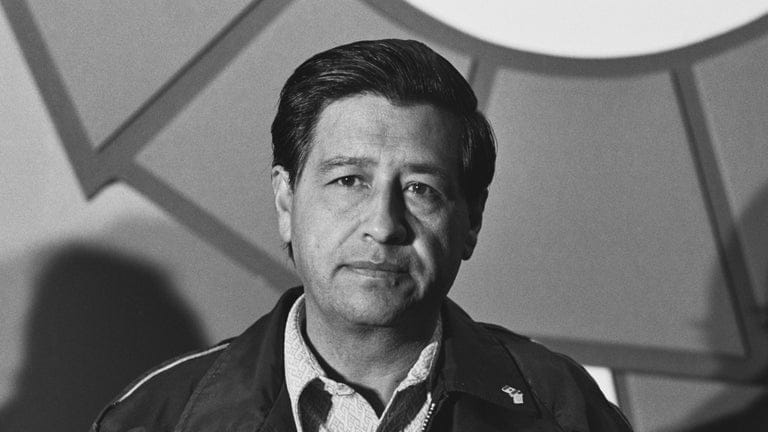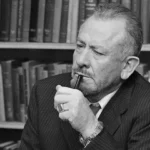Who’s ready for a journey through the life of an extraordinary man? Cesar Chavez, a legend whose fighting spirit left a lasting mark on the world, especially for those who toiled in the fields. From his humble beginnings as a migrant worker to his powerful leadership of a movement that changed everything, Chavez’s story is one that’ll leave you in awe. Let’s dive in, kids, and uncover the incredible facts that shaped the life of Cesar Chavez, the man who ignited a flame of hope and justice for farmworkers.
Amazing Cesar Chavez Facts for Kids
Alright, kids, gather ’round! Let’s learn about a real American hero – Cesar Chavez. He fought for fairness and kindness, and his story is one you won’t soon forget!
1. Cesar Chavez Knew Struggle From the Start
Cesar wasn’t born with a silver spoon. Nope, he was born into a family of migrant farmworkers. That meant his family traveled around a lot, following the harvest seasons to find work. They picked fruits and vegetables – tough work, especially under the hot sun. Cesar knew exactly how hard this life was because he lived it.
2. He Believed in Peace, Just Like His Heroes
Cesar had heroes, just like you and me! He really admired Mahatma Gandhi and Martin Luther King Jr.. These men fought for what they believed in without ever using violence, and Cesar thought that was super powerful. He decided to use peaceful protests to fight for fairness for farmworkers, too.
3. He Started a Group to Help Farmworkers
Way back in 1962, Cesar and some friends started a group called the National Farm Workers Association. Later, they changed the name to the United Farm Workers, or UFW. Think of it like a club where everyone works together to make things better for farmworkers.
4. He Led the Amazing Grape Boycott
Have you ever refused to eat something because you didn’t like it? Well, Cesar asked people to do that with grapes, but for a really good reason! For five long years, he encouraged people not to buy grapes. This was called a boycott. It made people pay attention to how unfairly farmworkers were being treated and helped improve their working conditions.
5. He Received a Very Special Medal
Because of all the good Cesar did, the President of the United States gave him a very important medal – the Presidential Medal of Freedom. It’s like a giant gold star for being an awesome person! This happened in 1994, and it showed everyone how important Cesar’s work was.
6. He Created a Place to Help Farmworkers and Their Families
Cesar didn’t stop at just fighting for better pay and working conditions. He wanted to help farmworkers and their families in every way he could. So, he created the National Farm Workers Service Center. This place is like a one-stop shop to help farmworkers and their families with all sorts of things, even things like getting healthcare or finding a place to live.
7. He Always Chose the Peaceful Path
Cesar was a firm believer in peace. He always said that violence was never the answer. He knew that real change happened when people worked together peacefully. Cesar organized marches and rallies, and he even went on hunger strikes to bring attention to the farmworkers’ cause. But he never, ever resorted to violence.
8. He Fought for Everyone’s Rights
Cesar knew that many Hispanic people, like himself, faced unfair treatment in many areas of life. He realized that fighting for farmworkers’ rights also meant fighting for the rights of all Hispanic people to have equal opportunities. He wanted everyone to be treated with respect and have the same chances in life.
9. His Legacy Lives On!
Even though Cesar is no longer with us, his spirit and message of hope live on. People all over the world, especially those fighting for fairness and justice, still look up to him. He showed us that even ordinary people can achieve extraordinary things if they are brave enough to stand up for what they believe in.
10. He Was Brave Enough to Never Give Up
Being a leader is hard work! Cesar faced lots of challenges, but he never, ever gave up. He knew that what he was fighting for was important, and that gave him the strength to keep going. Cesar’s courage and determination teach us that we should always fight for what’s right, even when things get tough.
What are 5 Interesting Facts About Cesar Chavez?
Let’s delve a bit deeper into the life of Cesar Chavez, a man who dedicated himself to fighting for the rights of farmworkers. You might be surprised by some of these fascinating tidbits about his life and work.
- “Yes We Can” – A Familiar Ring? You’ve probably heard the phrase “Yes We Can,” especially if you followed Barack Obama’s presidential campaigns. But did you know this powerful slogan has roots in the farmworker movement? It all started with Cesar Chavez and Dolores Huerta, who rallied supporters with the Spanish phrase “Si, se puede” during a hunger strike back in 1972. This simple yet powerful phrase, meaning “Yes, it can be done,” became a beacon of hope for the United Farm Workers (UFW) and later resonated with a much wider audience when Obama adopted its English translation.
- 38 Schools Before 8th Grade – A Testament to Resilience: Imagine trying to focus on your studies while constantly moving from place to place. This was the reality for young Cesar Chavez, whose family, like many migrant farmworkers, traveled frequently for work. By the time he finished 8th grade, Chavez had attended an astounding 38 different schools. This suggests that his experiences as a child greatly influenced his dedication to education equality. But Chavez’s experiences also fueled his belief in the power of education, which he saw as a vital pathway for social change and a better life for farmworkers.
- Immigration: A Complex Issue, Then and Now: The topic of immigration has always been complex, and Cesar Chavez grappled with it throughout his advocacy. Initially, he expressed concern that undocumented immigration could potentially undermine the UFW’s efforts and put legal workers at a disadvantage. However, as public opinion shifted towards supporting amnesty for undocumented immigrants, Chavez demonstrated his willingness to adapt and evolve. He gradually moderated his stance, reflecting the changing dynamics of this multifaceted issue.
- Thinking Outside the Box for Social Change: Chavez was a man who constantly sought new and effective ways to tackle social problems. In his later years, he became intrigued by alternative approaches to social change and explored organizations like Synanon, which started as a drug rehabilitation program but evolved into a controversial group with cult-like aspects. While the extent of Chavez’s involvement with Synanon remains a subject of debate, his willingness to explore unconventional methods highlights his commitment to finding solutions, even if they were controversial.
- A Legacy of Fighting for Fairness: Cesar Chavez is perhaps best known for co-founding the National Farm Workers Association in 1962, which later became the UFW. He dedicated his life to improving the often-difficult working conditions faced by farmworkers, who were often overlooked and underpaid. Chavez’s leadership in the successful Grape Boycott from 1965 to 1970 brought significant changes, leading to better wages and improved treatment for those who labored in the fields. His unwavering commitment to social justice continues to inspire activists and advocates today.
Key Takeaways:
- Chavez’s impact extends far beyond the fields he fought for. His use of nonviolent protest and powerful slogans like “Si, se puede” continues to influence movements for social change around the world.
- Despite facing incredible challenges in his own education, Chavez remained a passionate advocate for ensuring that all children, regardless of their background, had access to quality schooling.
- Chavez’s evolving views on immigration remind us that complex issues often require nuanced approaches and a willingness to adapt to changing circumstances.
- Chavez’s exploration of alternative paths to social change, while sometimes controversial, underscores his unwavering dedication to finding solutions to deeply rooted societal problems.
- Chavez’s legacy as a champion for farmworker rights serves as a powerful reminder that ordinary individuals can achieve extraordinary things when they fight tirelessly for justice and equality.
Citation:
- To learn more about Cesar Chavez’s life and legacy, you can check out his biography on Biography.com: “Cesar Chavez.” Biography.com, A&E Networks Television, 6 Oct. 2022, www.biography.com/activist/cesar-chavez. Accessed 24 Feb. 2023.
What is Cesar Chavez Known for?
Cesar Chavez was like a superhero for farmworkers! But instead of a cape, he had a powerful voice and a heart full of courage. He saw how unfairly farmworkers were treated – they worked super hard in tough conditions, often for very little pay. Cesar knew this wasn’t right and decided to do something about it.
He believed everyone deserved fair treatment, no matter their job. That’s why he started the National Farm Workers Association, which later became the United Farm Workers. You can think of it like a big club where farmworkers could come together and fight for their rights!
But Cesar wasn’t about fighting with fists. He followed the peaceful ways of Mahatma Gandhi, organizing peaceful protests, boycotts (where people refuse to buy certain things), and marches to get the attention of the people in charge. And guess what? It worked!
His famous saying, “Si, se puede” (Yes, it can be done!), became a rallying cry for change. It was like a magic spell that filled people with hope and encouraged them to keep fighting for what they believed in.
Because of Cesar’s tireless work, things started to get better for farmworkers. They were able to get better pay, health benefits to take care of themselves and their families, and even better places to live. It was a huge victory for Cesar and everyone who fought alongside him!
But Cesar’s legacy, the impact he made on the world, goes way beyond just farmworkers’ rights. He became a symbol of hope and inspiration for people fighting for social justice all over the world. He showed everyone that even ordinary people can achieve extraordinary things when they stand up for what they believe in.
Even today, Cesar Chavez’s story reminds us that it’s important to speak up for what’s right and to never give up on making the world a fairer and more just place for everyone.
What are 3 Important Events in Cesar Chavez’s Life?
We’ve been talking about Cesar Chavez, a true champion for farmworkers’ rights. But what were some of the big moments that really made a difference in his fight? Let’s dive into three events that show just how much impact one person can have:
1. He Started a Union for Farmworkers (1962)
Back in 1962, things were really tough for migrant farmworkers. They faced terrible working conditions and unfair treatment. Chavez knew something had to change. That’s why he co-founded the National Farm Workers Association (NFWA), which later became the United Farm Workers of America. This union became a powerful voice, fighting for better pay, safer working conditions, and basic legal protections that most of us take for granted.
2. Remember the Grape Boycott? (1965-1970)
This one was huge! Chavez knew that to get the attention of the powerful grape growers, they needed to hit them where it hurt – their profits. He organized a nationwide boycott of grapes, asking everyday people to stand in solidarity with the farmworkers. This boycott lasted for five long years! Imagine the dedication and sacrifice that took! But it worked. The boycott forced the grape growers to negotiate, resulting in better contracts and shining a spotlight on the struggles of these essential workers.
3. Taking on Harmful Pesticides (1984)
Chavez’s work went beyond just wages and contracts. He was deeply concerned about the health of farmworkers, especially the dangers they faced from pesticides. In 1984, he launched a boycott targeting grapes again, this time to raise awareness about the harmful pesticides used in their production. This boycott got people talking about the connection between the food they eat and the well-being of those who harvest it. It led to stricter regulations on pesticide use, making a real difference in the lives of farmworkers and consumers alike.
What can we learn from all of this?
- Chavez proved that peaceful protests and organized action can bring about real change, even against powerful forces.
- The Grape Boycott wasn’t just about grapes – it became a symbol of the struggle for social justice and inspired countless others to fight for what’s right.
- Chavez’s legacy goes far beyond farmworker rights. He showed us that we all have a responsibility to stand up for those who are marginalized and exploited.
Who is Cesar Chavez?
Imagine a time when farmworkers, many of whom were immigrants, had it really tough. They worked super hard picking our fruits and vegetables, but they weren’t treated fairly. Their pay was low, and their working conditions were often unsafe. It was like nobody was listening to their problems.
That’s where Cesar Chavez stepped in. He was like a superhero for farmworkers! He saw the injustices they faced and decided to do something about it. But instead of using his fists, Chavez used his voice and his heart. He believed in peaceful protests, just like Martin Luther King Jr. and Gandhi.
Chavez knew that things wouldn’t change unless people spoke up. So, he helped start a union called the United Farm Workers. It was like a team where farmworkers could join together and fight for their rights. They organized boycotts, asking people not to buy certain products until the farm owners treated workers fairly.
Can you imagine walking for miles and miles in the hot sun, just to make your voices heard? Well, Chavez and the farmworkers did that! They went on marches and even fasted, refusing to eat to show how serious they were about getting fair treatment.
And you know what? It worked! Because of Chavez’s leadership, farmworkers won better pay, safer working conditions, and the respect they deserved. He taught everyone that even ordinary people can achieve extraordinary things when they work together for what’s right.
His famous words, “Si, se puede!” which means “Yes, we can!” became a rallying cry for people fighting for justice everywhere. It’s a reminder that even when things seem impossible, we should never give up hope.
What are 3 of Cesar Chavez’s Achievements?
- Bringing Farmworkers Together with the National Farm Workers Association (NFWA): Imagine working tirelessly in the fields, your voice often unheard. In 1962, Chavez, alongside the equally incredible Dolores Huerta, formed the NFWA, which later became the United Farm Workers (UFW). This union was a game-changer. It gave these hardworking individuals the strength in numbers they needed to fight for fair wages, safer working conditions, and the respect they deserved. It’s like the saying goes, “There’s power in unity.”
- Leading the Way with Peaceful Protests: Think about the courage it takes to stand up for what’s right, especially when facing powerful opposition. Taking inspiration from Mahatma Gandhi’s philosophy of nonviolence, Chavez showed the world that peaceful protests could be a powerful force for change. He organized strikes, boycotts, and marches that caught the attention of people across the nation. His unwavering commitment to nonviolence not only pushed employers to negotiate but also set a powerful example for other civil rights movements around the world.
- Fighting for Legal Rights for Farmworkers: Chavez didn’t stop at organizing and protesting. He understood that real, lasting change required changes in the law. He dedicated himself to lobbying for laws that would protect the rights of farmworkers. His efforts played a crucial role in the creation of the California Agricultural Labor Relations Act. This act was a landmark victory, granting farmworkers the right to collective bargaining – meaning they could negotiate with their employers as a united group. He also worked hard to include amnesty provisions in the Immigration Reform and Control Act, which provided a way for undocumented farmworkers to gain legal status.
It’s important to remember that Cesar Chavez’s work continues to impact us today. His legacy reminds us that even in the face of adversity, one person’s dedication to justice can create a ripple effect, inspiring others to fight for a fairer and more equitable world.
What Made Cesar Chavez Unique?
One of the things that really made Chavez different was his rock-solid belief in nonviolent resistance. He wasn’t about fighting fire with fire. Instead, he took a page from the playbooks of icons like Gandhi and Martin Luther King Jr., believing that real change came from peaceful protest and thoughtful discussion. He knew that violence often just leads to more violence, and he wanted to break that cycle.
And Chavez wasn’t just talking the talk; he was walking the walk. He managed to unite farmworkers from all sorts of backgrounds – different races, different languages, different stories – under the common goal of fair treatment. He understood that their struggles were everyone’s struggles, and his ability to bring people together like that is a real testament to his leadership skills.
Think about it: getting people to agree on anything can be tough, right? Now imagine trying to unite people who are already facing so many challenges, people who’ve been pushed down and ignored for far too long. That’s what made Chavez’s ability to build bridges so remarkable.
He also knew how to get people’s attention. Chavez wasn’t afraid to use tactics like strikes, hunger strikes, and boycotts to shine a light on the injustices faced by farmworkers. These weren’t just attention-grabbing stunts; they were carefully planned strategies to apply pressure where it really hurt – the bottom line of powerful growers. By organizing these actions, he forced the nation to pay attention to the plight of the people who put food on their tables.
But maybe the most important thing about Chavez was that he truly understood the struggles of farmworkers. He wasn’t some outsider looking in. He had been there, working in the fields himself, experiencing the hardships firsthand. That personal connection fueled his passion and gave his words a weight that resonated with the people he fought for. He knew what it meant to be overlooked, to be taken advantage of, and he dedicated his life to making sure others didn’t have to endure the same.
While there’s no single answer to what made Chavez unique, it’s probably safe to say that it was a combination of factors: his unwavering belief in nonviolence, his knack for bringing people together, his strategic mind, and his deeply personal connection to the cause. He was a powerful voice for the voiceless, and his legacy continues to inspire movements for social justice today.
How Long Did Cesar Chavez Fast?
Cesar Chavez, the legendary labor leader and activist, didn’t just organize marches and rallies. He also used his own body as a tool for change. One of the most striking examples of this was his 25-day fast in 1968. That’s right, he went without food for a whole 25 days! But why would he do such a thing?
Well, Chavez was deeply inspired by Mahatma Gandhi and his philosophy of nonviolent resistance. He saw fasting not as a form of self-harm, but as a powerful way to draw attention to injustice and appeal to people’s consciences. At the time, farmworkers in California, many of whom were of Mexican descent, faced terrible working conditions and low wages. Chavez knew that to win their rights, he had to get the whole nation to pay attention.
So, he declared a fast, abstaining from all food for 25 long days. His decision sent shockwaves across the country. Newspapers and television stations picked up the story, and suddenly, everyone was talking about Cesar Chavez and the plight of the farmworkers. This fast wasn’t just about raising awareness; it was about pushing for concrete change.
It’s important to remember that fasting for such a long period is incredibly difficult. Chavez undoubtedly faced immense physical and mental challenges during those 25 days. Yet, he persevered, fueled by his unwavering belief in his cause and the principles of nonviolence. This extraordinary act of self-sacrifice resonated deeply with people from all walks of life. It shined a bright light on the struggles of farmworkers and ultimately played a significant role in garnering support for their cause.
Some experts suggest that Chavez’s fast marked a turning point in the farmworkers’ movement. It helped to mobilize public opinion and put pressure on growers to negotiate with the United Farm Workers union. While it’s difficult to definitively say whether this single act directly led to specific legal victories, its impact on the movement’s momentum and public perception is undeniable.
Chavez’s 25-day fast transcended the realm of a simple hunger strike; it became a powerful symbol of his unwavering commitment to nonviolence and his profound belief in the power of peaceful protest to effect change. It serves as an enduring testament to the idea that sometimes, the most potent weapon in the fight for social justice is not a weapon at all, but the unwavering spirit of a single individual.
Did Cesar Chavez Have a Wife?
You bet he did! Cesar Chavez’s wife, Helen Fabela Chavez, wasn’t just his life partner; she was a powerhouse in her own right and a cornerstone of the farmworker movement.
Think of it like this: behind every great man is a great woman, right? Well, Helen was that and more for Cesar. Born in 1928, she knew hardship from a young age, starting work in the fields when she was just seven years old. Life wasn’t easy, and she even had to leave school at 15 to help support her family.
She crossed paths with Cesar in 1942, and they tied the knot in 1948. They were a team, through and through, facing life’s ups and downs together and raising eight kids along the way! Talk about a full house!
But their dedication to social justice went far beyond their family. Helen and Cesar were passionate about improving the lives of farmworkers, and they poured their hearts into organizing with the Community Service Organization (CSO). While Cesar was often the one in the spotlight, Helen was the behind-the-scenes strategist, handling administrative tasks and basically keeping everything running smoothly.
And let’s be real, running a household with eight kids is a full-time job on its own, right? But Helen managed to juggle that with supporting Cesar’s political work and even helped him establish the United Farm Workers of America (UFW). That’s some serious dedication!
Sadly, history often forgets to give Helen the credit she deserves. It’s easy to focus on the big speeches and rallies, but it’s the quiet, tireless work behind the scenes that truly makes a movement succeed. Helen was the rock, the steady hand, and the unwavering support system that allowed Cesar to fight for what he believed in.
Her story reminds us that social change isn’t just about charismatic leaders; it’s about everyday people, especially women, who step up and make a difference in countless unseen ways. Helen’s legacy is a powerful testament to the strength, resilience, and often-unacknowledged contributions of women in social movements.
It’s also interesting to think about how Helen’s own background might have shaped her activism. Coming from a Mexican Revolution heritage, she likely had a deep understanding of injustice and a burning desire for change. And being a woman, a wife, and a mother in a time when those roles often came with limitations, her story gives us a unique window into the challenges and triumphs of women who dared to fight for a better world.
Helen Fabela Chavez might not have sought the limelight, but her impact on the farmworker movement and her enduring legacy are undeniable. She reminds us that real change requires the efforts of many hands, and that often, the quietest voices leave the loudest echoes.
What Are Some Interesting Facts About Julio Cesar Chavez?
Did you know that Luis Arraez, the talented baseball player, has a fascinating story? Learn more about his journey to the MLB in our article on facts about Luis Arraez. And don’t miss our in-depth exploration of the extraordinary life and career of tennis legend Gabriela Sabatini in facts about Gabriela Sabatini.
Alright, so we’ve covered some of the basics about Julio Cesar Chavez, but let’s dive into some of the details that make his story so captivating. This wasn’t just some fighter who showed up and won a few matches – this guy was a force of nature!
Think about this: in his very first professional fight, Chavez earned a measly twelve bucks. That’s right, twelve dollars. Fast forward through an incredible career, and we’re talking about a man who earned millions. This incredible journey from such humble beginnings to becoming one of the highest-paid athletes in the world is a testament to his hard work and raw talent.
And speaking of talent, did you know that Chavez remained undefeated for a staggering thirteen years? Let that sink in for a moment. Thirteen years at the top of his game, facing off against the best of the best, and emerging victorious time and time again. It’s this kind of almost superhuman determination and skill that earned him the nickname “El Gran Campeón Mexicano” – the name practically vibrates with power, doesn’t it?
Now, Chavez’s life wasn’t all sunshine and championship belts. He had his fair share of challenges and personal demons along the way. But even with those struggles, his impact on the world of boxing, especially in Mexico, is undeniable. He’s a legend who inspired countless young athletes to chase their dreams, proving that with enough grit and determination, anything is possible.
It’s one thing to read through stats and records, but it’s another to truly grasp the impact Julio Cesar Chavez had on boxing. He wasn’t just winning fights; he was captivating audiences, igniting national pride, and changing the way people saw the sport. His story is far from over, and his influence continues to shape the boxing world today.
What Did Cesar Chavez Dislike?
During a big chunk of his career, Chavez was really against illegal immigration. He wasn’t alone in this; some other labor leaders felt the same way. They were worried that folks coming in without papers would hurt the bargaining power of unions. Think about it— if there are more people willing to work for less, it makes it harder to fight for better pay and conditions for everyone.
This stance of Chavez’s created some real tension. It put him at odds with undocumented immigrants, a group that included many farmworkers he was trying to help. This difference in opinion likely weakened his union’s support and made things much more complex.
Now, this doesn’t mean Chavez didn’t care about the plight of undocumented workers. It’s more nuanced than that. He saw illegal immigration as a problem that needed a solution, but he believed that solution had to come with better protections for all farmworkers. He didn’t want to see anyone exploited, regardless of their immigration status.
It’s crucial to remember that historical figures like Chavez were complex individuals navigating a complex world. Their beliefs and actions were shaped by the time they lived in and the challenges they faced. Understanding these complexities helps us get a fuller, more human picture of who they were and what they were fighting for.
- SYBAU See You Baby Meaning: Gen Z Slang Evolves - July 1, 2025
- Unlock Your Inner Youth: Lifestyle Secrets for a Vibrant Life - July 1, 2025
- Decode SYBAU Meaning: Gen Z Slang Explained - July 1, 2025






